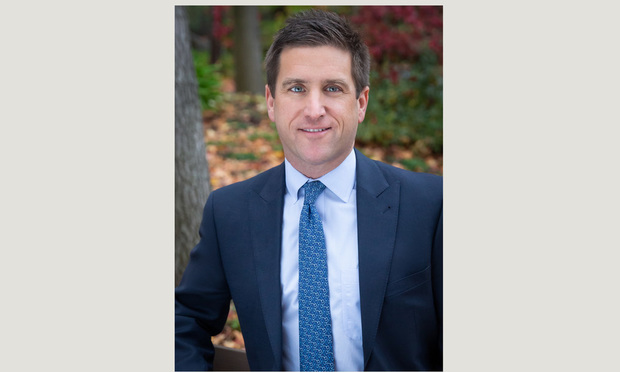Is a Boutique Trusts and Estates Practice Right for You?
While the large and midsized full-service firms are wooing lawyers to rebuild their trust and estates practices, the author contends that lawyers committed to the practice should not overlook the benefits of a boutique.
November 27, 2019 at 09:00 AM
5 minute read
 Ryan J. Szczepanik, principal with Hartog, Baer & Hand.
Ryan J. Szczepanik, principal with Hartog, Baer & Hand.
Trusts and estates practices come in a variety of forms—from standalone specialist boutiques to practices within larger firms.
A dedicated trusts and estates boutique firm by definition works exclusively in that space. Many of the full-service firms that shed their trusts and estates practices years ago are now rebuilding to compete for that work. In addition to bringing stability in economic booms and busts, providing this vital and highly personalized service helps keep the client's work "under one roof," limiting exposure to potential competition. While the large and midsized full-service firms are wooing lawyers for their rebuild, those lawyers committed to a trusts and estates practice should not overlook the benefits of a boutique.
As someone who practiced for many years at large firms before moving to my current boutique, I am accustomed to offering the highest caliber of legal services. I enjoy maintaining those standards while practicing in a more "user-friendly" environment.
Boutique firms emphasize specialization. For instance, most lawyers in distinguished trusts and estates boutiques are certified specialists in estate planning, trust and probate law who write and speak in that field. Specialized lawyers tend to be at the forefront of changes in the law and they are immersed in the day-to-day considerations of how the law is practically applied within the context of complex family and business structures. As a result, they are ideally positioned to help their clients. In the large-firm environment, lawyers are often required to divert attention to other fields.
The demand on large-firm lawyers to bill sufficient hours to meet the firm's billable requirement (typically at least 1,800 to 1,900 hours annually) can dominate other concerns—and conflict with the client's interest in superior and cost-efficient service. If a billable requirement exists at a boutique trusts and estates firm, it usually is far less than at the large firm. Many single-practice boutiques avoid creating an environment where lawyers compete against each other to bill hours, instead emphasizing a focus on clients' needs. That approach is most prevalent in areas of law like trusts and estates in which clients deal with delicate personal relationship issues.
Trusts and estates practices at larger firms tend to be the "loss leader." These firms place greater value on practices that permit leveraging to generate higher fees by assigning numerous lawyers to a matter. For example, litigation matters with large document productions and corporate transactions requiring substantial due diligence are prized for their billing (and earning) potential. This approach is antithetical to a premium trusts and estate practice.
Further compounding this dynamic, large-firm trusts and estates practices often must compete, or at least keep pace, with other practice areas in their firms by billing their partners at unrealistic rates. It is not unusual for a large firm trusts and estates partner's rate to exceed $1,000 per hour. The boutique firm has the flexibility to bill lawyers at lower rates.
Large-firm partners devote significant nonbillable time to firm administration matters unrelated to trusts and estates because they operate a large enterprise with costly overhead and complex financial arrangements. The central concern of the boutique partner, in contrast, is to further the business of providing superior and cost-efficient service on trust and estate matters.
Competition for the most capable associates can be fierce in a large firm. Practice areas with more internal political clout than trusts and estates must compete for associates' time (and, as noted, the higher billing practices tend to rule). The result is inconsistent associate availability and erratic service on trusts and estates matters.
In a single-practice firm, competition with partners in other practice areas is absent. The firm's associates are all committed to practicing trusts and estates law. Through purposeful hiring practices, the associates have the analytical and interpersonal talents conducive to success in that field.
Boutique firm lawyers work directly with clients earlier in their careers. Consequently, these lawyers generally develop greater client skills and knowledge on trust and estate matters. The result is lawyers who provide greater client value at less cost. Additionally, with a smaller and more concentrated client list, boutique firms can provide more individualized service. Taken together, clients experience the entire boutique firm's commitment to their success.
Finally, when all the lawyers at the firm are in the same field, they become intimately familiar with each other's strengths, and can leverage those strengths to the client's benefit. For instance, my practice is devoted to trust and estate litigation. Other lawyers at my firm practice estate planning, administration, and taxation, and I immediately know who to contact if my litigation matter raises thorny taxation and administration questions. In all likelihood, I did not know all the lawyers at the Big Law firms where I previously worked.
Selecting a law firm and practice platform is a critical decision. With large and midsize firms courting trusts and estates lawyers, it is important for those lawyers to not overlook the benefits of a boutique practice.
Ryan J. Szczepanik is a principal with Hartog, Baer & Hand. He is a California certified specialist in estate planning, trust and probate law. He can be reached at [email protected].
This content has been archived. It is available through our partners, LexisNexis® and Bloomberg Law.
To view this content, please continue to their sites.
Not a Lexis Subscriber?
Subscribe Now
Not a Bloomberg Law Subscriber?
Subscribe Now
NOT FOR REPRINT
© 2025 ALM Global, LLC, All Rights Reserved. Request academic re-use from www.copyright.com. All other uses, submit a request to [email protected]. For more information visit Asset & Logo Licensing.
You Might Like
View All
Law Firms Close Southern California Offices Amid Devastating Wildfires

Husch Blackwell Hires Former Adobe Counsel to Oversee AI Advisory Offering
3 minute read
Legal Tech's Predictions for Artificial Intelligence in 2025
Trending Stories
- 1Stevens & Lee Names New Delaware Shareholder
- 2U.S. Supreme Court Denies Trump Effort to Halt Sentencing
- 3From CLO to President: Kevin Boon Takes the Helm at Mysten Labs
- 4How Law Schools Fared on California's July 2024 Bar Exam
- 5'Discordant Dots': Why Phila. Zantac Judge Rejected Bid for His Recusal
Who Got The Work
Michael G. Bongiorno, Andrew Scott Dulberg and Elizabeth E. Driscoll from Wilmer Cutler Pickering Hale and Dorr have stepped in to represent Symbotic Inc., an A.I.-enabled technology platform that focuses on increasing supply chain efficiency, and other defendants in a pending shareholder derivative lawsuit. The case, filed Oct. 2 in Massachusetts District Court by the Brown Law Firm on behalf of Stephen Austen, accuses certain officers and directors of misleading investors in regard to Symbotic's potential for margin growth by failing to disclose that the company was not equipped to timely deploy its systems or manage expenses through project delays. The case, assigned to U.S. District Judge Nathaniel M. Gorton, is 1:24-cv-12522, Austen v. Cohen et al.
Who Got The Work
Edmund Polubinski and Marie Killmond of Davis Polk & Wardwell have entered appearances for data platform software development company MongoDB and other defendants in a pending shareholder derivative lawsuit. The action, filed Oct. 7 in New York Southern District Court by the Brown Law Firm, accuses the company's directors and/or officers of falsely expressing confidence in the company’s restructuring of its sales incentive plan and downplaying the severity of decreases in its upfront commitments. The case is 1:24-cv-07594, Roy v. Ittycheria et al.
Who Got The Work
Amy O. Bruchs and Kurt F. Ellison of Michael Best & Friedrich have entered appearances for Epic Systems Corp. in a pending employment discrimination lawsuit. The suit was filed Sept. 7 in Wisconsin Western District Court by Levine Eisberner LLC and Siri & Glimstad on behalf of a project manager who claims that he was wrongfully terminated after applying for a religious exemption to the defendant's COVID-19 vaccine mandate. The case, assigned to U.S. Magistrate Judge Anita Marie Boor, is 3:24-cv-00630, Secker, Nathan v. Epic Systems Corporation.
Who Got The Work
David X. Sullivan, Thomas J. Finn and Gregory A. Hall from McCarter & English have entered appearances for Sunrun Installation Services in a pending civil rights lawsuit. The complaint was filed Sept. 4 in Connecticut District Court by attorney Robert M. Berke on behalf of former employee George Edward Steins, who was arrested and charged with employing an unregistered home improvement salesperson. The complaint alleges that had Sunrun informed the Connecticut Department of Consumer Protection that the plaintiff's employment had ended in 2017 and that he no longer held Sunrun's home improvement contractor license, he would not have been hit with charges, which were dismissed in May 2024. The case, assigned to U.S. District Judge Jeffrey A. Meyer, is 3:24-cv-01423, Steins v. Sunrun, Inc. et al.
Who Got The Work
Greenberg Traurig shareholder Joshua L. Raskin has entered an appearance for boohoo.com UK Ltd. in a pending patent infringement lawsuit. The suit, filed Sept. 3 in Texas Eastern District Court by Rozier Hardt McDonough on behalf of Alto Dynamics, asserts five patents related to an online shopping platform. The case, assigned to U.S. District Judge Rodney Gilstrap, is 2:24-cv-00719, Alto Dynamics, LLC v. boohoo.com UK Limited.
Featured Firms
Law Offices of Gary Martin Hays & Associates, P.C.
(470) 294-1674
Law Offices of Mark E. Salomone
(857) 444-6468
Smith & Hassler
(713) 739-1250







